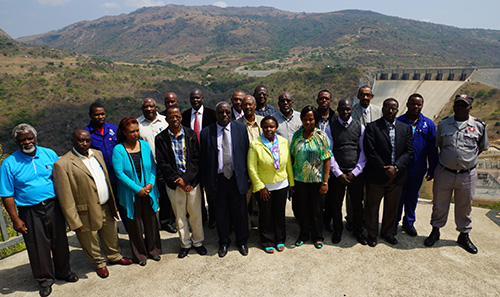 Mbabane, Swaziland, 25-09-2014: The Intergovernmental Authority on Development (IGAD) organized a study tour to Swaziland for member states’ officials in the field of agriculture and water management from September 21st to 25th in order to expose them to trans-boundary water management experiences and best practices in that part of the continent.
Mbabane, Swaziland, 25-09-2014: The Intergovernmental Authority on Development (IGAD) organized a study tour to Swaziland for member states’ officials in the field of agriculture and water management from September 21st to 25th in order to expose them to trans-boundary water management experiences and best practices in that part of the continent.
This study tour which was organized by the Inland Water Resources Management Program (INWRMP) of IGAD was led by Mr. Fred Mwango-INWRMP Team Leader with participation fom officials and legal experts holding high-level positions in Ministries of Agriculture and water management boards within IGAD member states.
The purpose of this tour that ended yesterday, was to expose IGAD officials to experiences and best practices accumulated by trans-boundary management institutions such as the Komati Basin Water Authority (KOBWA), a Swaziland-South Africa bi-national company formed in 1993 through the treaty on the Development and Utilization of the Water Resources of the Komati River Basin shared by the two countries plus Mozambique. It is in this respect that the IGAD officials and legal experts visited the KOBWA-run Maguga Dam that is located in about 63 kilometres outside Mbabane, capital city of Swaziland.
The IGAD delegation was received in the premises of KOBWA at the Maguga Dam itself by Dr. Sipho Nkambule, CEO of KOBWA, who welcomed them before taking them through a brief presentation of the Maguga hydro-power dam project. On the same day in the conference room of KOBWA Maguga Dam, Reverend Jameson Mucina gave the audience an overview of the tedious and elaborate relocation process of the local population initially living in the area affected by the Maguga Dam Project, as he was then appointed the Relocation Process Coordinator. A field visit to the host area was then arranged the following day for the delegation to witness the community development projects conducted as part of the compensations to the affected community.
On day two in the conference room of KOBWA Maguga Dam, Mr. Lenka Thamae, Pretoria-based Executive Secretariat of the Orange-Senqu River Commission (ORASECOM) that gathers Botswana, Lesotho, Namibia, and South Africa, came to meet with the IGAD officials and legal experts for a presentation of his Commission that was followed by a Q&A session. A presentation on the institutional framework of Southern Africa Development Community (SADC) Water Sector conducted by Mr. Pheras Ramoeli, Gaboronne-based Senior Water Program Officer-Southern Africa Development Community (SADC) Secretariat, prepared the ground for Mr. Lenka Thamae to help the audience situate themselves in a broader and more regional perspective.
On day three, The Swaziland Water and Agricultural Development Enterprise (SWADE) took the IGAD delegation on a field trip to Lubovane Dam, one hour and a half drive South of Mbabane, where they could see how sugar cane and other food commodities could grow in an arid area (an average of 630mms rainfall/year) thanks to a water catchment meant for irrigation purposes only.
“This was interesting and very instructive to everybody”, concluded Fed Mwango. “Members of the delegation could see first-hand how putting in place trans-boundary water management mechanisms can be challenging but still attainable”, he said.

